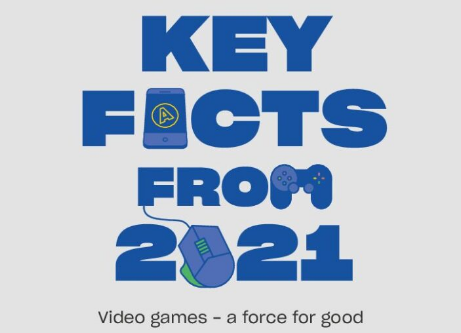What European Parliament’s resolution on esports and video games means for Europe and the sector itself
As Europe continues to move toward a more digital future, having the right talent, skills, innovation and growth are crucial to the region’s economic success. The video game industry represents one of Europe’s most compelling segments of cultural and creative industries. In 2021, Europe’s video game industry generated a market revenue of €23.3bn, and 52% of Europe’s population enjoy playing video games. The adoption today, passed by a huge majority, by the European Parliament of a strategy reflecting the industry’s important place in the EU’s creative and digital economy could not have come at a better time.
The resolution by the European Parliament’s Culture (CULT) Committee, led by MEP Laurence Farreng, shows a rare cross-political alignment of the value that Europe’s video games sector brings. It includes policy proposals that would help to create the necessary conditions for Europe to lead the way globally in video game innovation and creation.
So what do these recommendations mean for Europe and for Europe’s esports and video games sector? Here are some key takeaways:
Intellectual Property
The value of IP created by European video game companies is economically significant. As confirmed by the Faith report, IP, teams and technology are the three driving factors for investment and acquisition in studios.
The report calls for a European strategy for IP in video games that promotes existing European creations. Importantly, it recognises the landmark CJEU Case C355/12,which states that video games are complex works protected not only as a computer program but also by graphic and sound elements, which, while encrypted in computer language, have a unique creative value that cannot be reduced to that encryption.
Support measures
MEPs have recognised the need for investment and funding for European games industry SMEs that make up the majority of this sector. In particular, we welcome a call for national incentives and support, and the call for modernising European state aid rules such as the General Block Exemption Regulation. This will make it easier for Member States to support their local industry without having to go through cumbersome state aid notification procedures.
European jobs and talent
Over 98,000 people were employed in the Europe’s video games industry in 2020. To create one-of-a-kind video games, technology and creativity work in tandem, with input from a wide range of professionals. Software developers, artistic directors, musicians, graphic designers, and data analysts are just a few examples of the multitude of careers in the video game industry, which has the potential become synonymous with Europe.
MEPs are calling on the European Commission to address the shortage of digital skills in the workplace and to enhance access to, and development and retention of talent.
Education
Beyond the innovative, creative and artistic aspects of video games, it’s clear that they are something that will continue to grow in popularity and be concretely used in areas such as education. Why? It’s simple: there is a mountain of research that points to the fact that video games can offer several implicit educational benefits, such as the development of cognitive, spatial, and motor skills, as well as the improvement of ICT skills.
And to take it a step further, studies show that young girls who play video games are more likely to pursue a STEM degree compared to their non-game playing peers. Playing video games can teach and enhance girls’ creativity, strategic thinking and problem-solving skills, among other added benefits. This can positively impact the diversity and inclusion of an industry that has been historically very white and very male.
However, without the right resources and information available to teachers, it will be an uphill battle. 34% of teachers surveyed say they don’t feel confident or equipped for teaching for the future - it’s crucial that we ensure the industry is innovating in a way that does not leave others behind.
We agree wholeheartedly with the report’s recommendation that schools should have the necessary equipment and connectivity to allow for the use of video games by teachers to develop digital literacy, soft skills and creative thinking. With our Games in Schools project going into its seventh year, this is something we really welcome. We know what can be achieved in the classroom when teachers are empowered to use video games as a tool to enhance learning.
Esports
The report agrees that esports and sports are distinct sectors, particularly given the digital nature of video games used in esports and the critical role that intellectual property rights play in the sector. This is an important distinction for us because many of the popular video games seen in esports competitions and tournaments around the world were created or published by our members or members of our national trade associations in Europe.
The report also emphasises the sector’s “borderless nature”, which must be considered when addressing it. This is further acknowledged in the proposal to create an esports visa, based on the Schengen Cultural and Sports visas, which would apply to all personnel involved in organising and participating in esports competitions, including players, talent, administrators, coaches, and others.
The report also considers that esports can promote “positive values and skills, such as fair play, non-discrimination, teamwork, leadership, solidarity, integrity, antiracism, social inclusion and gender equality,” and calls on the Commission “to develop a charter to promote European values in esports”, in collaboration with publishers, team organisations, and other stakeholders, citing the example of the Principles of Esports Engagement created by the video games industry.
Environment
The report also recognises the role the video games sector can play in the EU's green transition, highlighting the power of video games to raise environmental awareness, as well as how the video games industry is approaching energy efficiency.
Responsible gameplay
Finally, we welcome the recognition of PEGI, which is the de facto sector-specific self- and co-regulation for minor protection. Initiated by the European Institutions in 2003, it supplements existing consumer protection law with specific rules for the video games sector. It is likely one of Europe's most successful industry examples, as it is now used in 38 European countries, far beyond the EU's 27. The advantage of PEGI is that it is a flexible tool that can adapt to evolving trends in video games. For example, in 2019, PEGI adopted the in-game purchase icon for random items - so-called loot boxes - that are used in some games (note that less than 3% of PEGI-rated games include such items, meaning that the vast majority of PEGI-rated games do not include such features) to ensure that parents and players are informed prior to play and purchase of such features. This information requirement is now part of recent EU consumer protection guidance, and it is an excellent example of how self- and co-regulatory instruments can be used to deal with new situations quickly. While PEGI is best known for its age and content labels, its backbone is its Code of Conduct, a set of rules that every publisher who uses the PEGI system contractually agrees to. Our industry has long taken a safety-by-design approach, putting responsible game play at the centre of video game development. Over the last 20 years, the industry has continuously improved its parental control tools, which are integrated into both hardware and software.
We look forward to continued dialogue with policy makers to shine a light on Europe’s video games and esports industry. By giving this sector the attention and support it deserves, the EU can cement its position as a European digital powerhouse.
You can take a look at the full picture of Europe’s video games sector in Video Games Europe’s Key Facts about Europe’s video games sector for 2021 report here. Learn more about esports in our Guide to Esports.



